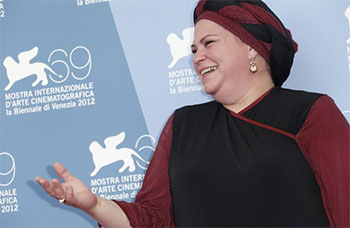 Vampire Weekend's Surprising Jewish Stories
Vampire Weekend's Surprising Jewish Stories


5 min read
Chasidic Israeli filmmaker Rama Burshtein’s fascinating film is almost as fascinating as her own story.
Walking down the red carpet at the Venice Film Festival last August, Chasidic Israeli filmmaker Rama Burshtein presented an unusual sight. In contrast to the other women gliding down the fabled walkway wearing the typical Hollywood style revealing gowns, the writer and director of the critically acclaimed film “Fill the Void” wore a long, simple gown that she had sewn herself, her hair covered by a kerchief.
”Fill the void” has earned praise from critics and outperformed box office expectations.
She found the attention surrounding her a little unnerving, but it went with the territory of having made the most successful Israeli film of 2012: “Fill the Void” won seven “Ofir” awards – the Israeli equivalent of the Oscars. The film was also an official selection of the Toronto International Film Festival, the New York Film Festival, and the Venice Film Festival, where Hadas Yaron captured Best Actress Award for her portrayal of Shira. Not since the 2004 Israeli-made film “Ushpizin” has a feature film that focused sympathetically on the Orthodox community also earned praise from critics and outperformed box office expectations.
 Now in general release in the U.S. and continuing to garner rave reviews, “Fill the Void” centers on a Chasidic family in Tel Aviv, and opens with the happy occasion of the engagement of Shira, just 18 years old. Happiness quickly turns to grief when Shira’s older sister dies in childbirth, leaving behind an anguished family, heartbroken community, and a newborn who needs a mother. When Rivka, mother of the two sisters, learns that her son-in-law, Yochay, plans to move to Belgium to remarry, she is so distraught at the thought of losing contact with her grandchild that she proposes a radical plan: that Yochay marry Shira instead. The rest of the drama involves Yochay’s and Shira’s initial disbelief at the prospect and their tentative steps toward learning whether this match could work.
Now in general release in the U.S. and continuing to garner rave reviews, “Fill the Void” centers on a Chasidic family in Tel Aviv, and opens with the happy occasion of the engagement of Shira, just 18 years old. Happiness quickly turns to grief when Shira’s older sister dies in childbirth, leaving behind an anguished family, heartbroken community, and a newborn who needs a mother. When Rivka, mother of the two sisters, learns that her son-in-law, Yochay, plans to move to Belgium to remarry, she is so distraught at the thought of losing contact with her grandchild that she proposes a radical plan: that Yochay marry Shira instead. The rest of the drama involves Yochay’s and Shira’s initial disbelief at the prospect and their tentative steps toward learning whether this match could work.
The movie powerfully reveals life in a tight-knit, purposefully insular community. In one scene, the community’s rebbe (played by an Orthodox actor) allows himself to be interrupted during an important meeting to deal patiently with a lonely, elderly woman claiming an emergency. But while showing the heart of the community, the movie does not sugarcoat the complexities and stresses of that world, where unmarried women feel anxious about their single state. In another scene, Shira endures a painfully bad date in her parents’ living room, wishing her prospective suitor good luck as she closes the door. And one of Shira’s friends continues to fight despair as suitors pass her by for other women.
Rama Burshetin was born in New York but grew up in what she describes as a very liberal and secular family in Israel. She graduated from the Sam Spiegel Film and Television School in Jerusalem in 1994, and during those years became deeply religious. Upon her graduation she decided to apply her filmmaking skills as a tool for self-expression in the Orthodox community. “I set out on this journey out of a deep sense of pain,” she explains in an interview with Jewlarious.com. “I felt that the Orthodox community has no voice in the cultural dialogue. You might even say we are mute. I wanted to take the fog off the community.”
“Fill the Void” avoids any issues involving the religious-secular divide. “I’m not good at agendas and politics,” Burshtein explains. “What I’m good at is telling a story. This film takes place mainly in the home, showing the heart of a family and community.” The storyline was sparked by a true incident, when Burshtein met a very young woman who became engaged to her brother-in-law after her sister passed away. “That was all I needed to set my imagination into overdrive and start writing the story. My work has always focused on relationships between men and women,” she explains.
“Fill the Void” shows the active role of Chasidic parents in proposing marriage matches, but also shows that these marriages are never forced. Shira wants to do the right thing for her family, but her youth and inexperience make it hard for her to understand and acknowledge her own feelings. Without idealizing the Chasidic world, or any of the characters and their relationships, Burshtein skillfully reveals a community where the values of love, loyalty, duty and dignity are paramount. The emotional honesty of the film makes the characters’ emotional struggles relatable even though their lives are radically different than most who will see it.
Burshtein admits a delightful surprise at the overwhelming critical acclaim for “Fill the Void” and its impact across the religious spectrum. One religious woman called her to say she cried during the entire movie because the movie had made her feel beautiful, and less lonely as a Chareidi woman. And during her media tour, a nonreligious man told Burshtein that he had always viewed Chareidi people whom he saw in public as “ugly” and even “stinky.” After watching the film, they were so humanized in his eyes that he found them “beautiful, even sexy.”
Burshtein is well aware that many consider her anti-feminist because she has chosen to live a Chasidic life and portrays that world with affection. But in the film, the women are quietly influential in many ways, which mirrors what she has seen since joining that community years ago.
“We have Chasidic women who are amazingly creative in many ways, but they don’t have to be in the center. Where does that need come from? I started to realize the power of not being in the center. It doesn’t mean we don’t exist, it just means you are quiet. It’s hard for women to accept being quiet,” she told Jewlarious.com.
Burshtein is now working on a new movie that also centers on a romantic relationship in the Chasidic community, and this time, the setting will be New York. Based on the enthusiastic reaction to her first feature film, audiences will surely look forward to the next story Rama Burshtein has to tell.
